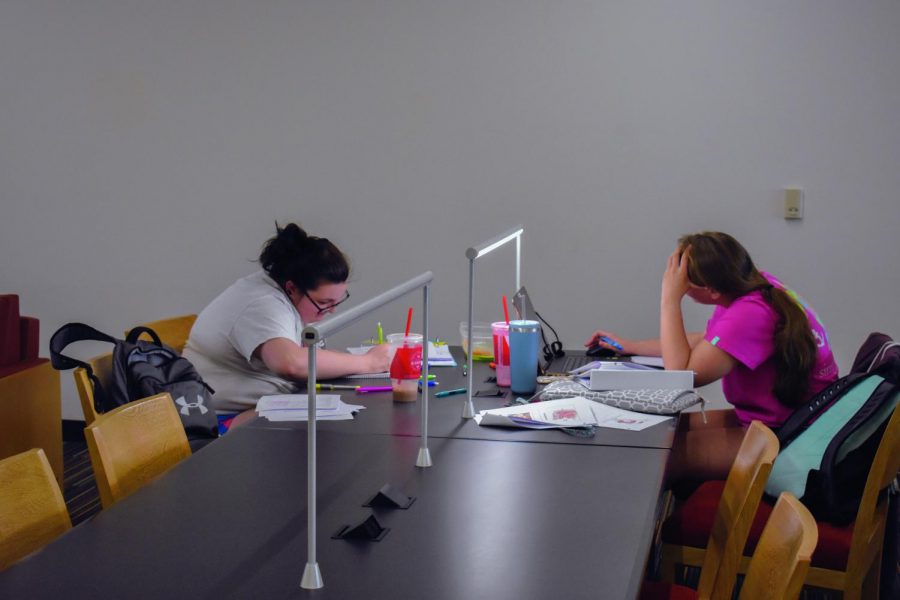Students study to ease nerves for final exams
Summer Brooks, a second-year radiology student (left), and Alexis Weisgerber, a second-year physical therapy student, study to relieve the stress of final exams.
April 30, 2019
AACC students and faculty said in April that studying, physical activity and relaxing can help ease the stress of final exams.
Beth Mays, a registered nurse and manager of the campus Health and Wellness Center, said stress management is different for everyone.
“It’s about stopping all of the internal chatter that’s clouding your head,” she said. “Physical activity is a great resource. We have our StressLess lounge [with a] massage chair and a DVD, which goes through progressive guided imagery and deep breathing.”
Carey Christensen, a graduating culinary arts student, suggested that students studying for finals should take regular, brief breaks.
She recommended taking a half hour between studying for each class because “it reduces stress during studying and allows you to soak in the information you learned before the break.”
Other students recommended listening to music and being active.
“For me, music helps,” said graduating culinary arts student Tristan Martin. “It helps me retain the information I’m taking in because I’m blocking out everybody else. The music I’m listening to is plain instrumental.”
Angelique Karditzas, a health and exercise studies adjunct instructor, suggested yoga as a way for students to relieve test stress. She recommended the “legs up the wall” position, which students can do almost anywhere.
“It’s extremely restorative,” she explained. “It brings all of the blood flow down into the internal organs, into the heart space. … It can help calm your nerves and it really can give you more energy.”
The campus Health & Wellness Center and Collegiate Recovery Center will host a “stress buster” event on May 9 before final exam week.
Students can participate in stress-relieving activities and pick up handouts about deep breathing and mindfulness, Mays said.
Students and faculty also pointed out that thoroughly studying for tests can reduce stress on exam day.
“I had a bunch of anxiety my first semester here,” said first-year broadcast journalism student Jake Brannon. “But studying helped relieve pressure going into the exam because I knew more than I anticipated.”
Richard Otten, an adjunct instructor of American studies and gender and sexuality studies, said last-minute cramming for tests is a recipe for failure.
“I would prefer if students would engage in the course as best they can and do what they’re assigned to do,” he explained. “Prepare for class and the grade should take care of itself.”
John Dale Cunanan, a second-year information technology student, added, “Study ahead of time and as hard as you can. For me, I try to pay attention in class and study lecture [notes].”
Kenneth Arnold, second-year physics student, said talking about stress to a professional could be helpful.
“Unless you get an outside opinion, you’re never going to see the whole picture [of how stress is affecting you],” Arnold said.
Mays encouraged students to keep calendars to help with time management.
“Budget in your time with family,” May said. “If you can find those [free] minutes and use those minutes, they can make a big difference.”
Some students also recommended studying in groups as a way to share notes.
Devin Brown, an instructional coordinator in the School of Science and Technology, advised students to “get a good night’s rest the day before the exam. … Wake up in the morning and be positive.”












